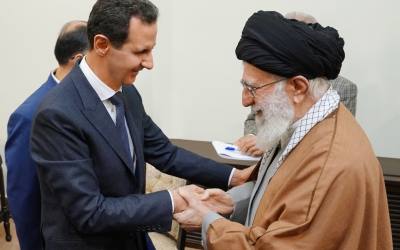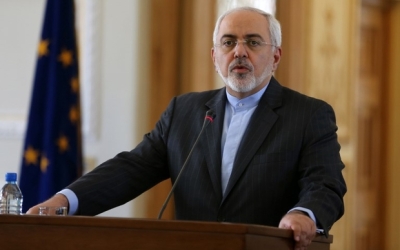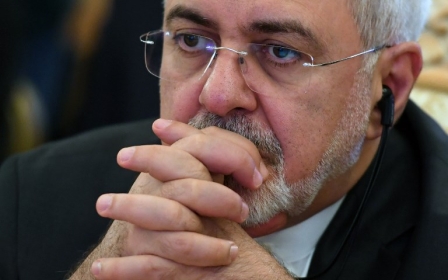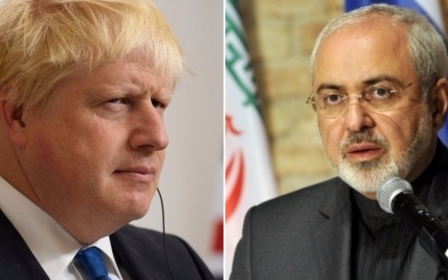Iran's Foreign Ministry says Zarif's resignation has not been accepted
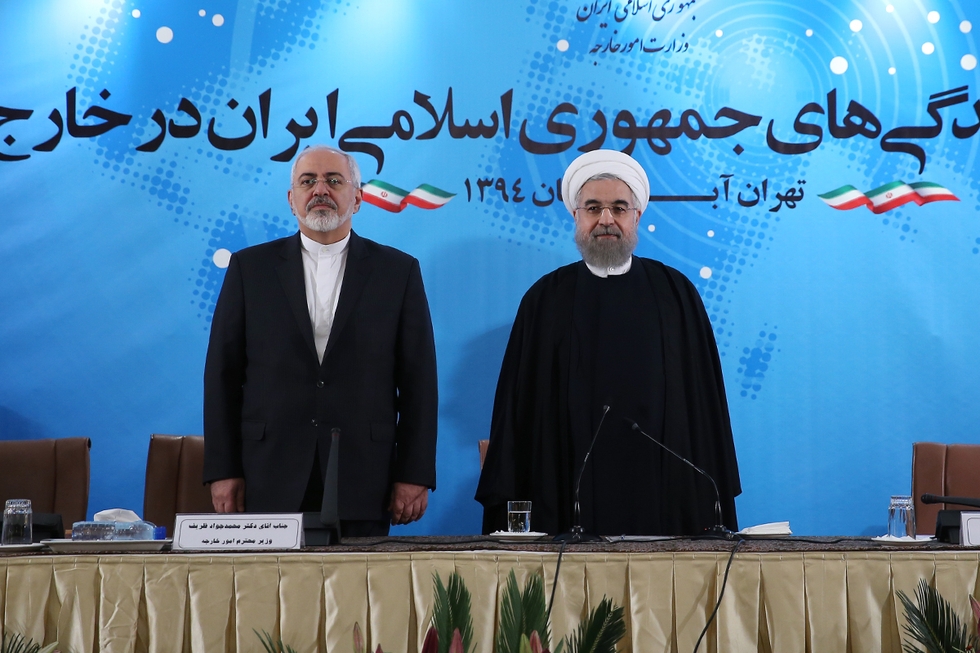
An Iranian Foreign Ministry spokesman says President Hassan Rouhani has not accepted the resignation of Foreign Minister Javad Zarif, a day after he said he was quitting, rejecting reports in media.
"All interpretations and analysis around the reasons behind the resignation of Foreign Minister Mohammad Javad Zarif, beyond what he posted on his Instagram account, are not accurate and, as the chief of staff of the president of Iran said today, the resignation has not been accepted," spokesman Bahram Qasemi was quoted as saying by Fars News Agency.
Earlier on Tuesday, Rouhani, who must accept any resignation by his ministers for them to become official, appeared to stand by Zarif, with his chief of staff posting a photo on Instagram of the two men together.
"In the view of Dr Rouhani, the Islamic Republic of Iran has only one foreign policy and one foreign minister," Mahmoud Vaezi, the chief of staff, wrote.
"The words of the president today in praising his foreign minister are a clear sign of the satisfaction of the representative of the people of Iran about the wise and effective positions and work of Dr Zarif and a tough response to some biased and incorrect analyses."
Stay informed with MEE's newsletters
Sign up to get the latest alerts, insights and analysis, starting with Turkey Unpacked
'He [Zarif] and his boss [Rouhani] were under huge amount of pressure'
- anonymous Zarif ally
Earlier on Tuesday, Rouhani had thanked Zarif, along with Iran's oil minister and central bank governor, for being at the frontline of the battle against America.
The remarks, cited by the Islamic Republic News Agency (IRNA), made no reference to Zarif quitting.
On Monday, Zarif had written on his own Instagram page that he was resigning, stating: "Many thanks for the generosity of the dear and brave people of Iran and its authorities over the past 67 months."
He gave no specific reasons for his decision, but cited an "inability to continue serving".
An ally of Zarif said on Tuesday that pressure from hardliners over Iran's nuclear deal with world powers had forced him to resign.
"There were closed-door meetings every week, where top officials were bombarding him with questions about the deal and what will happen next and so on," the ally told the Reuters news agency on condition of anonymity.
"He and his boss [Rouhani] were under a huge amount of pressure."
Zarif played an important role in striking a 2015 landmark nuclear deal between Iran and six world powers.
But he came under attack by Iranian hardliners after the United States pulled out of the agreement last May and reimposed economic sanctions on some of the country's key industries.
Parliament plea
A majority of Iran's parliamentarians signed a letter to Rouhani on Tuesday, asking for Zarif to continue in his job, Ali Najafi Khoshroodi, the spokesman for the parliament's National Security and Foreign Policy commission, told IRNA.
Some Iranian media reports indicated Zarif had resigned over Syrian President Bashar al-Assad's visit to Tehran on Monday, with outlets noting that the foreign minister was not pictured in any of the coverage of the visit.
Iran's Entekhab news website reported on Monday night that its reporter had reached Zarif and asked via text message why he had resigned.
"After the photos of today's meetings, Javad Zarif as the foreign minister has no credibility around the world," said Zarif, according to Entekhab.
Rouhani said on Tuesday that Assad had thanked Iran's foreign ministry during his visit to Tehran, according to IRNA.
Zarif urged diplomats and other employees at the foreign ministry not to quit on Tuesday, according to IRNA.
'Deadly poison'
In an interview published on Tuesday, Zarif was quoted as saying fighting between parties and factions in Iran is a "deadly poison" undermining foreign policy.
Fars reported that the interview had taken place last week, before the resignation.
"We first have to remove our foreign policy from the issue of party and factional fighting," Zarif told the Jomhuri Eslami newspaper.
"The deadly poison for foreign policy is for foreign policy to become an issue of party and factional fighting," he added.
'Heated debates in Tehran'
Zarif told the newspaper he had followed the guidance of Supreme Leader Ayatollah Ali Khamenei, the highest authority in the Islamic Republic, during the nuclear negotiations.
He said US President Donald Trump and his national security adviser John Bolton, rather than Rouhani, were to blame for the US withdrawal from the deal.
Trump withdrew from the deal in May and reimposed sanctions on Iran.
"Instead of condemning Trump, why do you come and condemn the elected president of the people? You come and condemn the foreign policy?" Zarif said.
"What result does that have? The result is that people will become hopeless about the future."
Joe Macaron, a fellow at the Arab Center Washington DC, said announcing a resignation on Instagram is "unconventional and unprecedented" for an Iranian official.
"It seems... Zarif submitted his resignation letter and went on social media before either Rouhani and Khamenei [could] react to this resignation, which might mean that Zarif is locked in a fight with hardliners on what directions should the Iranian foreign policy take amidst growing US pressure on its economy," Macaron told MEE via email.
"We are yet to know the full story behind this resignation, but it seems to reflect heated debates in Tehran around the foreign policy challenges facing the Iranian regime."
Sina Toossi, research associate at the National Iranian American Council (NIAC), also noted the "striking and strange" nature of the announcement on Instagram.
He said the use of the popular, uncensored social media platform in Iran may have been a deliberate attempt for the news to reach the public directly.
"It could be a kind of calculated play where Zarif is submitting his resignation in a public way on Instagram... If Rouhani does not accept his resignation, if indeed he does not resign, he could come back empowered," Toossi told MEE.
"He offered his resignation; there was a huge outcry. He could come back stronger in his position."
But if the foreign minister's resignation is accepted, Toossi said, it would be a major shift in the domestic balance of power away from the "moderate, pragmatic, reformist faction that Zarif embodies, especially on foreign policy".
'Good riddance'
US Secretary of State Mike Pompeo, in a post on Twitter, dismissed Zarif and Rouhani as "front men for a corrupt religious mafia".
"Our policy is unchanged - the regime must behave like a normal country and respect its people," Pompeo said.
"Zarif is gone. Good riddance," Israeli Prime Minister Benjamin Netanyahu said of Zarif's resignation.
"As long as I am here, Iran will never acquire nuclear weapons," Netanyahu tweeted.
Born in 1960, Zarif lived in the US from the age of 17 as a student in San Francisco and Denver, and subsequently as a diplomat to the UN in New York, where he served as Iran's ambassador from 2002 to 2007.
He was appointed minister of foreign affairs in August 2013 after Rouhani won the presidency in a landslide, on a promise to open up Iran to the outside world.
Since taking charge of Iran's nuclear talks with major powers in late 2013, Zarif has been summoned to parliament several times by hardline lawmakers to explain the negotiations.
Some hardliners even threatened Zarif with bodily harm after the nuclear deal was signed.
Middle East Eye delivers independent and unrivalled coverage and analysis of the Middle East, North Africa and beyond. To learn more about republishing this content and the associated fees, please fill out this form. More about MEE can be found here.


